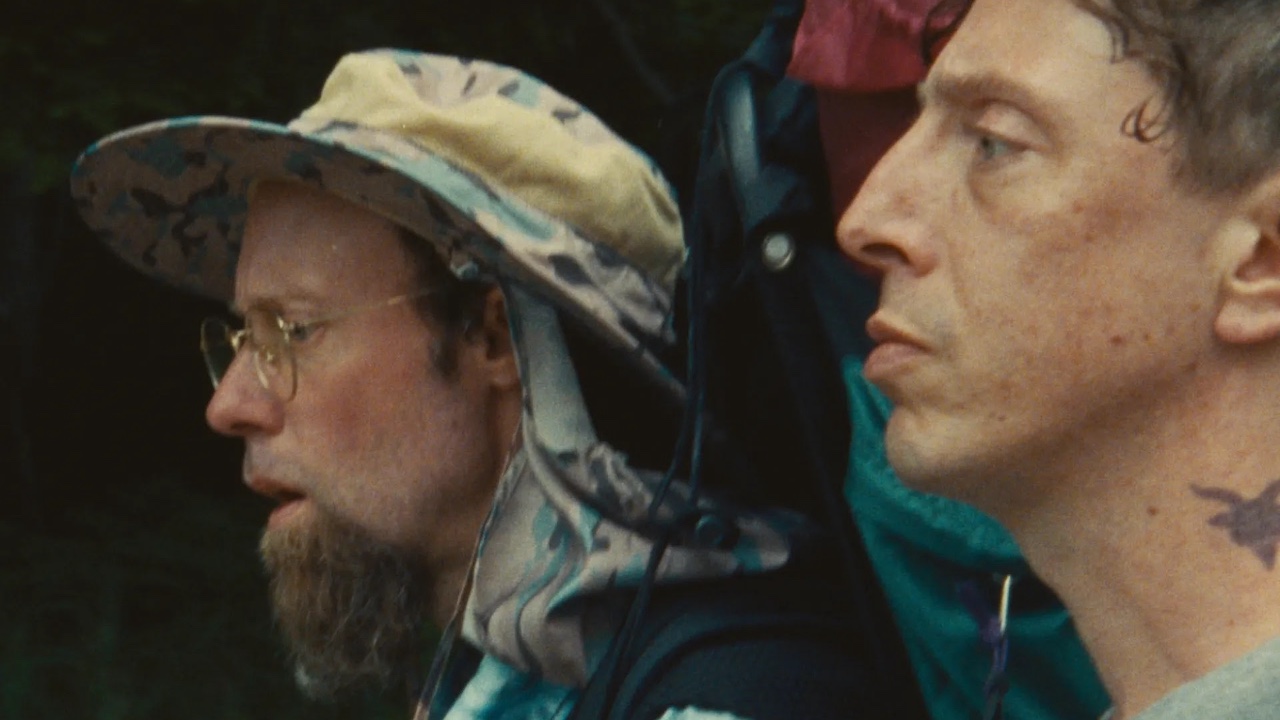There’s a fine line between poetry and nonsense, a line that filmmaker Joel Potrykus has made a point of straddling for years. His films—which include his 2014 breakout Buzzard and, most recently, 2018’s Relaxer—often revolve around angry, disillusioned, immature men circling the drain of their own psyches. Men of not only arrested development, but development on death row, awaiting complete annihilation. The joke, as grim as it may be, is on them, even if their pitiful existence makes us think twice about laughing directly in their face.
More often than not, this man is played by Joshua Burge, an actor for whom the term “hangdog” was seemingly invented. This is true of Vulcanizadora, as well, which sees Burge star opposite Potrykus himself. The film begins on their faces and, for the first half at least, is focused solely on the pair’s misbegotten odyssey into some anonymous Michigan forest. Even before the central conceit is introduced—slowly, then all at once—there’s a distinct sense of dread to the whole affair. Most of the first half of the film finds Potrykus spouting gibberish so inane that it begins to hypnotize with its stupidity. His self-assuredness, as sufferable as it might be, is achingly translucent, window-dressing for a deep sadness and blatant, severely uncharming desire to be liked.
Burge, on the other hand, is almost completely silent, providing nothing in the way of validation to his helplessly needy companion, becoming a slowly expanding pit of despair at the center of the film. These men are both pathetic in their own distinct way, children wandering through the woods digging up porn, lighting firecrackers, and cosplaying warrior poses with felled branches—wonderful renderings of the two guys from your high school you’d least like to run into. Then, just as the film begins to test the viewer’s patience, Potrykus drops, in a fit of manic revelation, a philosophical question that will stick with me for some time: What if hell is not the burning pit of misery we might imagine, but simply being nervous and sad for all time?
And with that, Vulcanizadora’s screw is officially turned, leaving behind the feeble tragicomedy of the first half and embracing a final act so bleak, so full of self-perpetuating agony, that the hell imagined by Potrykus seems a relative oasis. It’s here that Burge truly shines. Though “shine” might not be the right word, as it’s precisely the gaping pit of compounding dread he evinces that makes the performance so arresting. Bringing to mind the ghostly figures of similarly tar-toned films like You Were Never Really Here and Blue Ruin, Burge’s putrid psych stench hangs over him like a nihilistic Pig-Pen.
Potrykus has never been a filmmaker of sentimentality, but Vulcanizadora is perhaps his most compelling work yet for how big a hole he’s willing to blow in his characters’ flimsy facades. These are characters for whom redemption is so implausible as to not even be considered—by them or by us—and the film never even flirts with such an idea, the foreboding pit of each scene neither promising nor offering much in the way of relief. The only real catharsis Potrykus seems prepared to offer could only really satisfy the gluttons for punishment at the film's center. And when it does arrive, the only real relief comes in knowing that, in the end, the two succeeded after all, as harrowing as that success might be.







